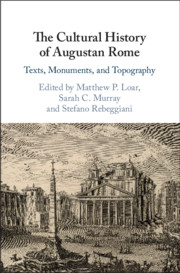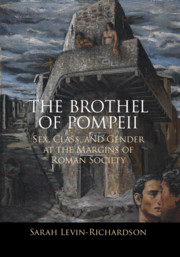Refine search
Actions for selected content:
5930 results in Classical art and architecture
Chapter 5 - The Porticus Liviae in Ovid’s Fasti (6.637–648)
-
- Book:
- The Cultural History of Augustan Rome
- Published online:
- 29 May 2019
- Print publication:
- 30 May 2019, pp 103-125
-
- Chapter
- Export citation
Contents
- from Chapter 5 - The Porticus Liviae in Ovid’s Fasti (6.637–648)
-
- Book:
- The Cultural History of Augustan Rome
- Published online:
- 29 May 2019
- Print publication:
- 30 May 2019, pp 103-124
-
- Chapter
- Export citation
Works Cited
-
- Book:
- The Cultural History of Augustan Rome
- Published online:
- 29 May 2019
- Print publication:
- 30 May 2019, pp 160-186
-
- Chapter
- Export citation
Figures
-
- Book:
- The Cultural History of Augustan Rome
- Published online:
- 29 May 2019
- Print publication:
- 30 May 2019, pp ix-ix
-
- Chapter
- Export citation
Chapter 2 - Cicero, quid in alieno saeculo tibi?
-
-
- Book:
- The Cultural History of Augustan Rome
- Published online:
- 29 May 2019
- Print publication:
- 30 May 2019, pp 27-44
-
- Chapter
- Export citation
Copyright page
-
- Book:
- The Cultural History of Augustan Rome
- Published online:
- 29 May 2019
- Print publication:
- 30 May 2019, pp iv-iv
-
- Chapter
- Export citation
Introduction
-
-
- Book:
- The Cultural History of Augustan Rome
- Published online:
- 29 May 2019
- Print publication:
- 30 May 2019, pp 1-9
-
- Chapter
- Export citation
Index
-
- Book:
- The Cultural History of Augustan Rome
- Published online:
- 29 May 2019
- Print publication:
- 30 May 2019, pp 187-192
-
- Chapter
- Export citation
Chapter 3 - The Julian Calendar and the Solar Meridian of Augustus
-
-
- Book:
- The Cultural History of Augustan Rome
- Published online:
- 29 May 2019
- Print publication:
- 30 May 2019, pp 45-79
-
- Chapter
-
- You have access
- HTML
- Export citation
Contributors
-
- Book:
- The Cultural History of Augustan Rome
- Published online:
- 29 May 2019
- Print publication:
- 30 May 2019, pp x-x
-
- Chapter
- Export citation
Chapter 7 - Ovid’s Two-Body Problem
-
-
- Book:
- The Cultural History of Augustan Rome
- Published online:
- 29 May 2019
- Print publication:
- 30 May 2019, pp 141-159
-
- Chapter
- Export citation
Contents
-
- Book:
- The Cultural History of Augustan Rome
- Published online:
- 29 May 2019
- Print publication:
- 30 May 2019, pp vii-viii
-
- Chapter
- Export citation
Abbreviations
-
- Book:
- The Cultural History of Augustan Rome
- Published online:
- 29 May 2019
- Print publication:
- 30 May 2019, pp xiii-xiv
-
- Chapter
- Export citation
Chapter 6 - Greek Poets on the Palatine
-
-
- Book:
- The Cultural History of Augustan Rome
- Published online:
- 29 May 2019
- Print publication:
- 30 May 2019, pp 126-140
-
- Chapter
- Export citation
Dedication
-
- Book:
- The Cultural History of Augustan Rome
- Published online:
- 29 May 2019
- Print publication:
- 30 May 2019, pp v-vi
-
- Chapter
- Export citation
Chapter 4 - Monument Men
-
-
- Book:
- The Cultural History of Augustan Rome
- Published online:
- 29 May 2019
- Print publication:
- 30 May 2019, pp 80-102
-
- Chapter
- Export citation
Chapter 1 - Monumental Insignificance
-
-
- Book:
- The Cultural History of Augustan Rome
- Published online:
- 29 May 2019
- Print publication:
- 30 May 2019, pp 10-26
-
- Chapter
- Export citation

The Cultural History of Augustan Rome
- Texts, Monuments, and Topography
-
- Published online:
- 29 May 2019
- Print publication:
- 30 May 2019

The Brothel of Pompeii
- Sex, Class, and Gender at the Margins of Roman Society
-
- Published online:
- 25 May 2019
- Print publication:
- 23 May 2019
Four - Frescoes
- from Part I
-
- Book:
- The Brothel of Pompeii
- Published online:
- 25 May 2019
- Print publication:
- 23 May 2019, pp 64-80
-
- Chapter
- Export citation
